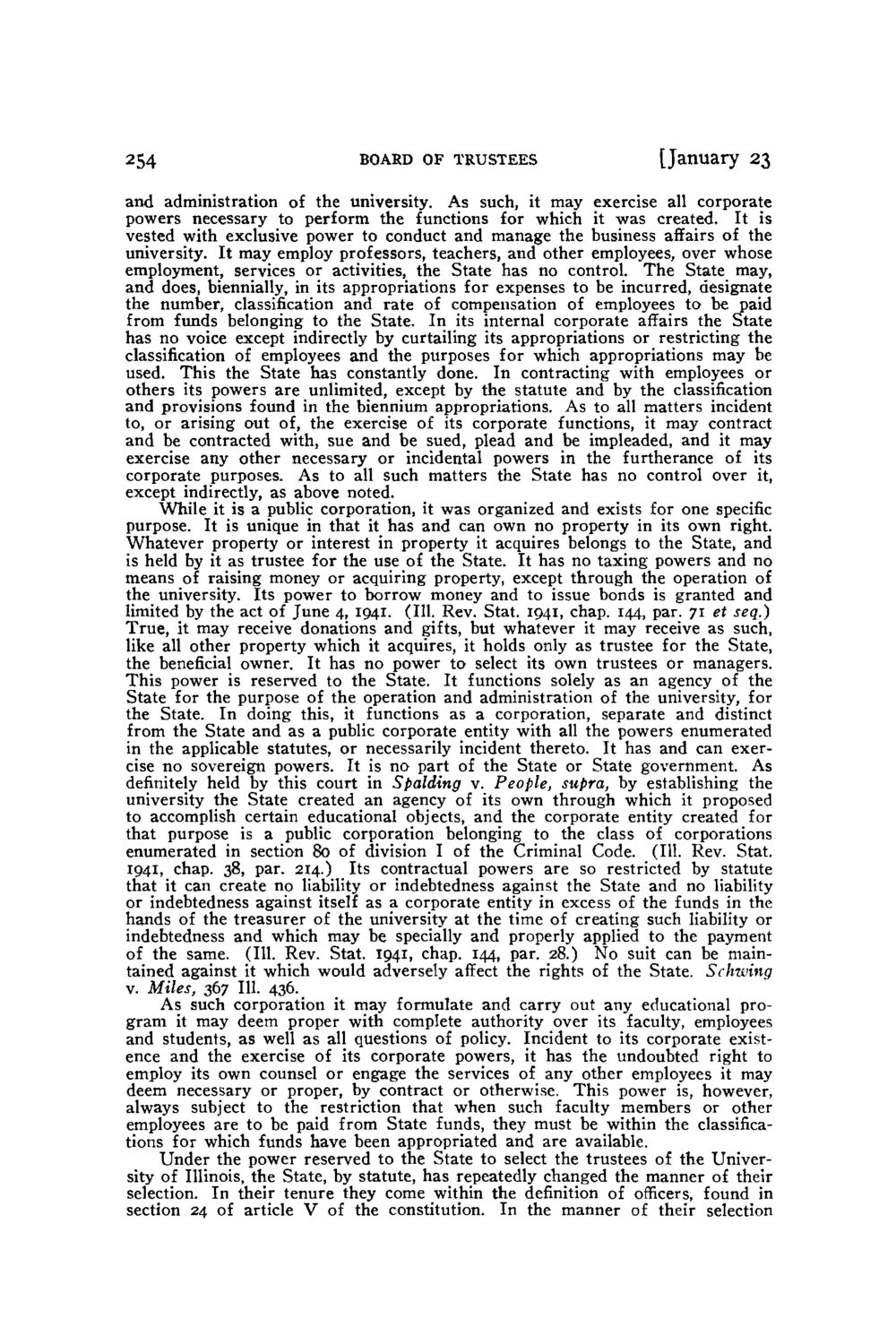| |
| |
Caption: Board of Trustees Minutes - 1944
This is a reduced-resolution page image for fast online browsing.

EXTRACTED TEXT FROM PAGE:
254 BOARD OF TRUSTEES [January 23 and administration of the university. As such, it may exercise all corporate powers necessary to perform the functions for which it was created. It is vested with exclusive power to conduct and manage the business affairs of the university. It may employ professors, teachers, and other employees, over whose employment, services or activities, the State has no control. T h e State may, and does, biennially, in its appropriations for expenses to be incurred, designate the number, classification and rate of compensation of employees to be paid from funds belonging to the State. In its internal corporate affairs the State has no voice except indirectly by curtailing its appropriations or restricting the classification of employees and the purposes for which appropriations may be used. This the State has constantly done. In contracting with employees or others its powers are unlimited, except by the statute and by the classification and provisions found in the biennium appropriations. As to all matters incident to, or arising out of, the exercise of its corporate functions, it may contract and be contracted with, sue and be sued, plead and be impleaded, and it may exercise any other necessary or incidental powers in the furtherance of its corporate purposes. As to all such matters the State has no control over it, except indirectly, as above noted. While it is a public corporation, it was organized and exists for one specific purpose. It is unique in that it has and can own no property in its own right. Whatever property or interest in property it acquires belongs to the State, and is held by it as trustee for the use of the State. It has no taxing powers and no means of raising money or acquiring property, except through the operation of the university. Its power to borrow money and to issue bonds is granted and limited by the act of June 4, 1941. (111. Rev. Stat. 1941, chap. 144, par. 71 et seq.) T r u e , it may receive donations and gifts, but whatever it may receive as such, like all other property which it acquires, it holds only as trustee for the State, the beneficial owner. It has no power to select its own trustees or managers. This power is reserved to the State. It functions solely as an agency of the State for the purpose of the operation and administration of the university, for the State. In doing this, it functions as a corporation, separate and distinct from the State and as a public corporate entity with all the powers enumerated in the applicable statutes, or necessarily incident thereto. It has and can exercise no sovereign powers. It is no part of the State or State government. As definitely held by this court in Spalding v. People, supra, by establishing the university the State created an agency of its own through which it proposed to accomplish certain educational objects, and the corporate entity created for that purpose is a public corporation belonging to the class of corporations enumerated in section 80 of division I of the Criminal Code. (111. Rev. Stat. 1941, chap. 38, par. 214.) Its contractual powers are so restricted by statute that it can create no liability or indebtedness against the State and no liability or indebtedness against itself as a corporate entity in excess of the funds in the hands of the treasurer of the university at the time of creating such liability or indebtedness and which may be specially and properly applied to the payment of the same. (111. Rev. Stat. 1941, chap. 144, par. 28.) No suit can be maintained against it which would adversely affect the rights of the State. Schwing v. Miles, 367 111. 436. As such corporation it may formulate and carry out any educational program it may deem proper with complete authority over its faculty, employees and students, as well as all questions of policy. Incident to its corporate existence and the exercise of its corporate powers, it has the undoubted right to employ its own counsel or engage the services of any other employees it may deem necessary or proper, by contract or otherwise. This power is, however, always subject to the restriction that when such faculty members or other employees are to be paid from State funds, they must be within the classifications for which funds have been appropriated and are available. Under the power reserved to the State to select the trustees of the University of Illinois, the State, by statute, has repeatedly changed the manner of their selection. In their tenure they come within the definition of officers, found in section 24 of article V of the constitution. In the manner of their selection
| |